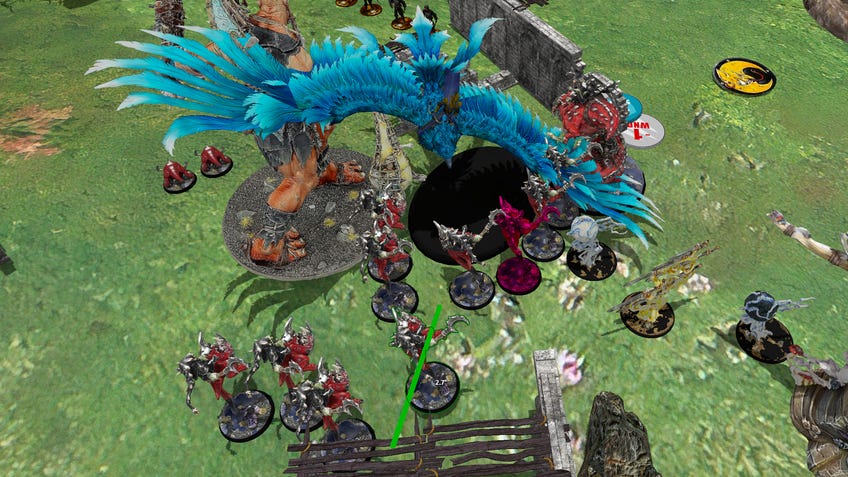‘It’s been a life-saver’: The Warhammer fans who’ve taken tournaments online during lockdown
Forward Slaanesh.
One of the biggest benefits of tabletop gaming is that it is a social event. It is something you do in person with friends. Rules formalise interactions with strangers, allowing you to have a great experience with all of the checks and balances worked out for you.
Despite all the upsides, miniature wargaming can have its drawbacks. Figuring out a way to transport a force of delicate minis is another hobby in and of itself, especially as companies like Games Workshop keep making more and more elaborate minis - such as the Void Dragon and Morathii - that are a challenge to put in any kind of carry case. Despite the occasional awkwardness, the fun of rolling dice, pushing around minis, and laughing as you share in a succession of triumphs and failures is for many the peak of the hobby that they are involved in.
It's so great a joy, in fact, that regular tournaments are held across the country by many different groups, from the official Warhammer events orchestrated by Games Workshop at its Lenton Lane headquarters in Nottingham to the wide variety of tournaments by the various independent scenes in the UK.
Until 2020, one scene in particular had been incredibly healthy, not only in the UK, but worldwide. Warhammer: Age of Sigmar, Games Workshop’s Fantasy Battle replacement that got off to a shaky start in 2015, has become one of the more popular tournament games of recent years.
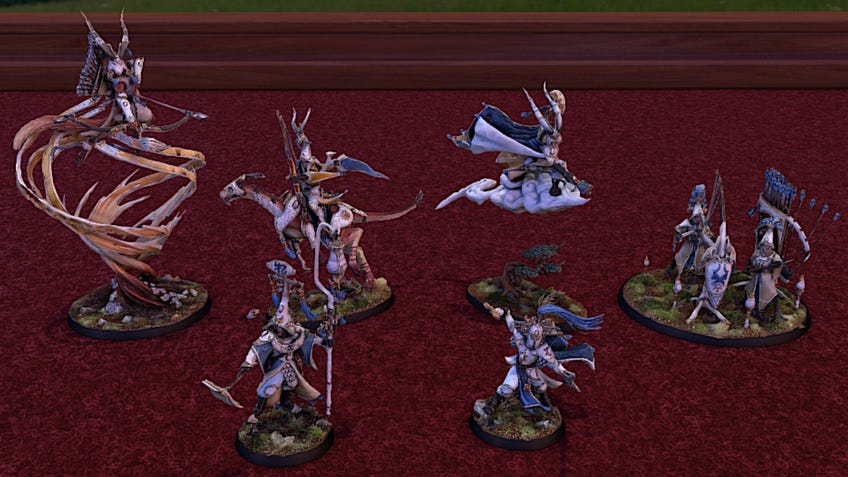
Recent events have changed all that. Face-to-face interactions are not possible right now, and for the last 12 months, in-person games of Warhammer have been few and far between across the world. Games Workshop has not stopped its release train, however; although the publisher has slowed down its release frequency from a pre-order every week to one every other week, rules and models are still coming out.
The desire to play with these new units, new factions and new rules is high, especially within a game as healthy in its competitive environment as Age of Sigmar. In response, players have taken to playing matches via Tabletop Simulator in order to chase the highs and lows of the tournament scene. The program lets people play a variety of board games by simulating a fully 3D environment, and features many mods created by users.
I could see there was a growing community of people playing Age of Sigmar on TTS and as a competitive player I knew that people wanted tournaments.
One of the biggest Age of Sigmar events on Tabletop Simulator is Hammertime. Run by Owen Jackson, the online-only tournament is well into the planning stages for its eighth iteration. Jackson is a self-professed Warhammer nerd; like many, he got into it when he was younger. "My brother Will and I collected Warhammer in our early teens - Dwarves were our army - but much like many peeps in the hobby we got distracted with frivolous activities in our late teens."
In early 2018, Jackson found himself in a familiar place: back in a Games Workshop store, inexplicably drawn towards the over-the-top, post-rock album cover fantasy of Age of Sigmar. Later that year, he attended his first Age of Sigmar tournament, Warfare - a local event in Reading. He was immediately hooked. "From there I basically attended every tournament I could, I think it was around 27 in 2019 and a couple before lockdown - you could say I caught the bug!"
Despite having never touched Tabletop Simulator before lockdown hit in the UK last spring, Jackson could see there was a demand for some form of outlet in the tournament community. Age of Sigmar had been increasing in popularity as a competitive game, with even Games Workshop itself acknowledging the rise of competitive play in its 'Metawatch' articles on Warhammer Community.
"I could see there was a growing community of people playing Age of Sigmar on TTS and as a competitive player I knew that people wanted tournaments," Jackson says. "I ran a little tournament for my birthday and everyone had a great time, so I ran the first Hammertime event soon afterwards."
Hundreds of people from all over the world are able to connect, communicate and share their passion for this game despite language barriers and time zone differences.
Since then, there have been six more Hammertime tournaments and other adjacent events. Hammertime Seven had 82 players "from all over the world" involved. In comparison, the upper bracket of the larger, in-person tournaments in 2019 ranged from 96 players at Blackout to 192 at BOBO, two of the largest independent Age of Sigmar events run in the UK.
Jackson tries to keep things fresh every time. "I've tried some interesting unique formats, such as removing the top six armies from the event or every list needing to include a Mega-Gargant, and the community has always got on board." His overall opinion is one that doesn't seem a world apart from my time spent spectating at events: wargames are a very particular niche. "The major takeaway from the events for me is just what a wonderful game Warhammer is; hundreds of people from all over the world are able to connect, communicate and share their passion for this game despite language barriers and time zone differences."
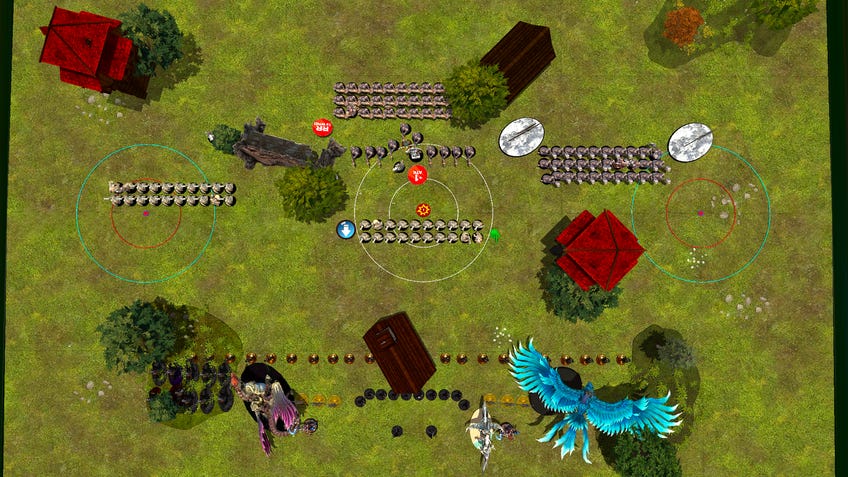
The difference between playing Warhammer in person and over Tabletop Simulator is something that needs to be considered. Tournaments are not just about winning - they are social scenes, a place to show off the hobby, with nearly all tournaments having some painting awards and best player scoring. There is also the fact that digital games are, well, digital. Using TTS requires a new subset of skills, and TTS mods for Age of Sigmar are just that: mods. They are explicitly fan-made, and as such there is no official support from Games Workshop. TTS also does not have rules hard-coded in. This reinforces the feel of it being a tabletop game - everything needs manually tracking - but many of the quality of life improvements found in direct digital translations are missing.
Much like in real life, if you have a nice time playing someone then future games are planned and friendships formed.
Tabletop Simulator occupies a different space, one that is digital and inherently less social, but it is still a space that is in demand. Jackson is quick to add that "whilst it's not the same as playing in person you do really get to know the players, so rivalries develop, and there is a buzz around the top tables with many people watching".
"Much like in real life, if you have a nice time playing someone then future games are planned and friendships formed."
The Hammertime Discord is a testament to this, full of personality and activity even when tournaments aren't running. Rules Discussions, Tournament Ideas and general Age of Sigmar Chat are some of the available channels, and everyone is on hand to help new players get involved.
Jackson is upfront about the challenges of Tabletop Simulator, saying: "[TTS] has benefits and drawbacks; measuring is definitely more accurate but it's hard to hide your intent as your opponent can see exactly what you are measuring." Part of the reason why Games Workshop has been so hesitant to have its games directly adapted into digital form is because there may be a danger of digital versions replacing a portion of players, but there is also an issue with combining something inherently analogue with something digital. There are ways around this, but something is lost in translation.
"The ability to mark up, colour code and apply auras to your models is definitely a plus," he adds, "but the way models interact with terrain is often annoying and time consuming and the finer points of piling can be lost." There are unexpected benefits, as well. For such a dice-heavy game, Jackson feels that the fast dice rolling in TTS papers over a few cracks, whereas I miss the tactile clattering of dice when I watch others play.
I raise doubts about the personalities of players shining through - Warhammer tournaments are full of cosplay, heavily converted theme armies, unique gimmicks and trinkets, and, of course, wonderfully painted miniatures. In his time running tournaments digitally, Jackson has found that these things are more or less preserved. "You have super organised players and less organised players on TTS just like in real life - which mods you use still does mean you can add personality and table manner transfers over to TTS, it's still player versus player."
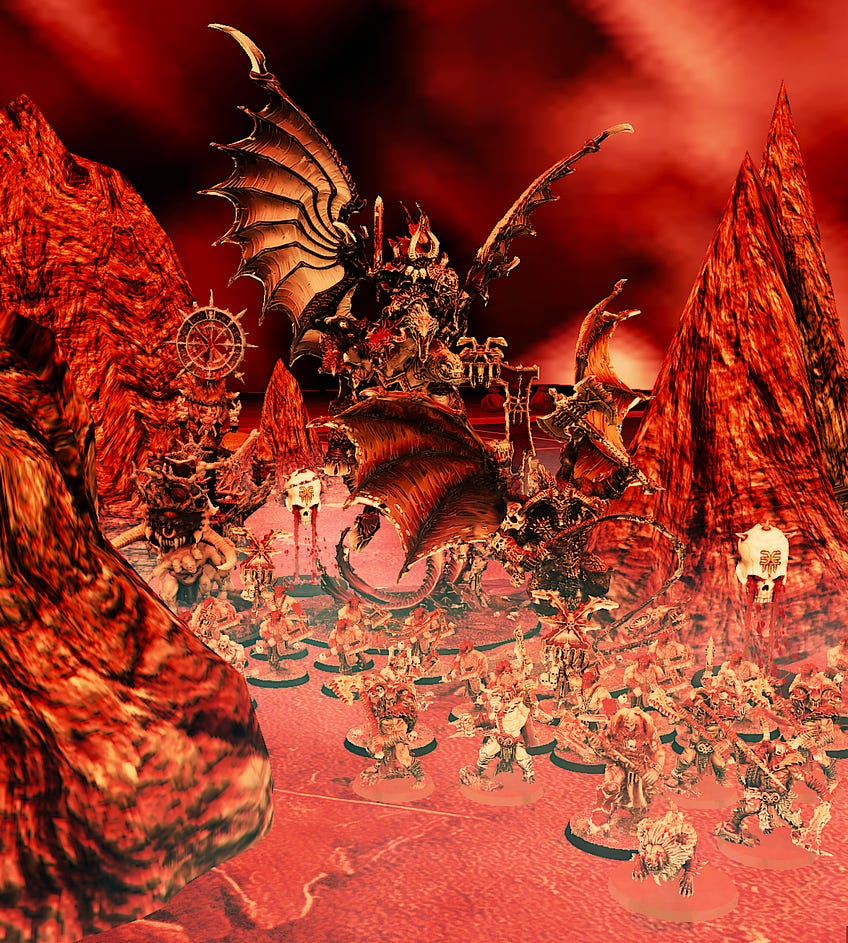
As painting is a huge part of the hobby, most TTS games are played with imported standees. It is entirely possible to use photogrammetry, or use photographs as 2D standees, but it's a laborious process. Those who know their way around 3D design programs such as Blender have a much easier time making small modifications to the digital models. Despite all of this, there are definite differences. "Not seeing the models, the painting and conversions is a drawback and the preamble and post-game chats are really missed," Jackson says. As for the social side? "No Saturday night tournament curry with tales from tabletop is probably the biggest miss!"
Not seeing the models, the painting and conversions is a drawback and the preamble and post-game chats are really missed.
Despite the pros and cons, people are playing Age of Sigmar via Tabletop Simulator, and Games Workshop is still releasing new rules and new armies. The Broken Realms series of expansions has only had one volume so far, but has had a significant impact on the overall strength of Idoneth Deepkin and made changes to Daughters of Khaine that have since been reinforced with their new Battletome. I have started building a new Hedonites of Slaanesh army, and currently have no way of playing them outside of TTS.
This got me wondering: what effect will Tabletop Simulator have on the Age of Sigmar competitive scene? After all, all the theorycrafting in the world doesn't hold a candle to actual play experience. Jackson largely agrees: "I definitely think people playing on TTS will have an edge post-lockdown. There is no substitute for practice, so players who are grinding online, practising and honing lists will really hit the ground running."
There's also a consideration to make with the practicality of buying and playing lists that rely on bizarre combinations of expensive models, and a player's ability to practise multiple lists without painted armies. "TTS does mean you can try out so many lists and units, meaning you make better purchasing decisions so your hobby time is more efficiently used too,” Jackson says.
It's a double-edged sword in some respects, as Games Workshop has been put in a tough place by the pandemic. The hobby will continue regardless of events, but the balance of the game is part of its health too.
“Age of Sigmar is such a complicated game with so many rules, interactions and combinations that I feel GW does a pretty good job,” Jackson says. "They have brought Steve Wren in to run the events and now have Sam Pearson (one of the rules writers) at the events to answer rules inquiries there and then which is great and they have definitely improved that side of things."
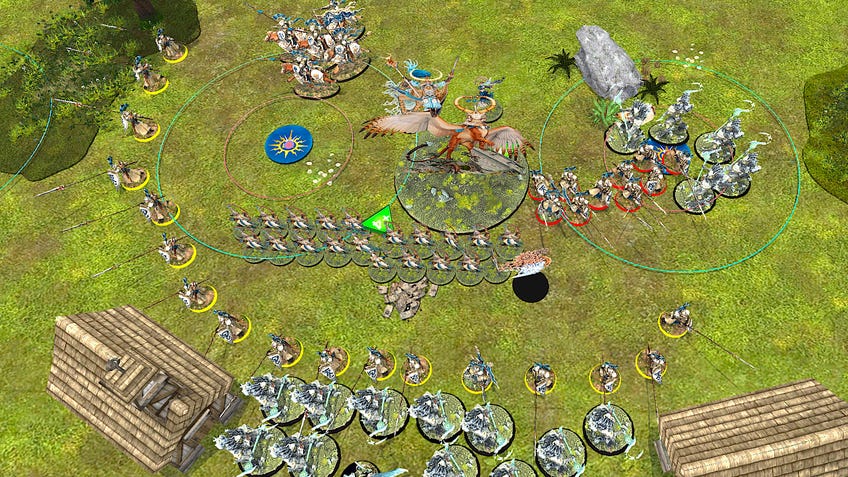
It isn't all positives, however. Jackson talks about the last major hiccup from GW: the underbaked and late Winter FAQ, which didn't adequately address questions that many in the community had. Some may baulk at a demand for the competitive edge of the game to be the focus of contention, but Jackson’s take is something I agree with: "All players - competitive or otherwise - really do need to see that the game is being monitored and balanced, some really obvious points changes could have been made. I'm sure the competitive scene is such a small part of the overall hobby, but we are a super passionate and knowledgeable community who love the game."
The ability to play against people all over the world, play any army, practice deployments, do workshops etc. is an amazing tool which gamers will continue to use.
What's next is anyone's guess. Age of Sigmar continues to get updates; the roadmap for Broken Realms has fans waiting for the rise of Teclis; the return of the Shadow King, Be'lakor; and the appearance of a mysterious new god, Kagros. When lockdown eases off, and social events are back on, the Age of Sigmar tournament scene is sure to swell again.
Which leads to a question: what of the online scene when in-person play resumes? Will it be relegated, or remain as a welcome inclusion? Jackson thinks it's here to stay in some form. "Playing in person is obviously the way we all want to play Warhammer, but the ability to play against people all over the world, play any army, practice deployments, do workshops etc. is an amazing tool which gamers will continue to use."
It is essentially a tool. Whilst Warhammer as a hobby can be as cheap or as pricey as you want, the tournament scene requires bleeding-edge lists, painted armies, all the latest books and transport. Being able to elide some of that cost by practicing digitally might help hone lists before events. Even more importantly than that, Tabletop Simulator has provided a new way to play Warhammer that ignores the boundaries of distance. It has been a salve for many, as Jackson observes: "TTS has been such a life saver during lockdown for so many people in the global Warhammer and wider gaming community we won't want to turn our backs on it."
Hammertime 8 takes place on April 17th 2021. Sign-ups are currently open.
